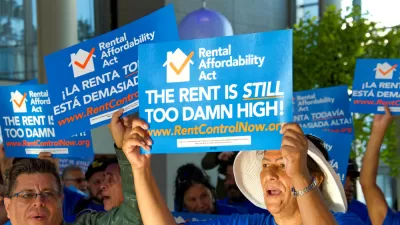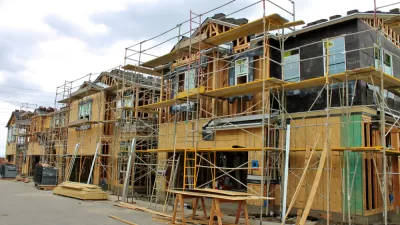While statewide efforts to loosen zoning restrictions have made news in (mostly) blue states like California and Oregon, (mostly) red states like Florida have been preventing local governments from passing their own housing policies.

Sophie Kasakove reports on the flip side of the state preemption coin—red states blocking local government from approving new housing policies.
California and Oregon have made national news for several years with their efforts to upzone around transit stations and end single-family zoning, respectively. California still hasn't approved statewide legislation, after both SB 827 and SB 50 failed. Oregon, however, succeeded in approving House Bill 2001. Oregon also implemented statewide rent control.
Less well known, however, is the fate of an upzoning and inclusionary zoning ordinance approved in Miami in December 2018. "At the end of June, Florida's governor approved a law banning municipalities from passing mandatory inclusionary zoning ordinances, sending Miami's city councilors back to the drawing board," according to Kasakove.
That's just the latest example of states shutting down the ability of local governments to approve affordable housing toolkits, writes Kasakove. "In total, at least 35 states currently enforce some limitation on cities' ability to protect or create affordable housing, whether by preventing them from enacting rent control and anti-discrimination measures, mandating inclusionary zoning, regulating short-term rentals, or some combination of these measures."
In fact, Republican-controlled state legislatures have been very effective in approving preemption laws on a number of subjects, not just housing development: "In the past decade, especially following the Republican Party's 2010 electoral takeover of state houses, preemption legislation has become an increasingly common method for conservatives to secure control over a range of issues of concern, from minimum wage laws to plastic bag bans."
Back to housing policy, as preemption in conservative states has expanded beyond its roots in the anti-rent control politics of the 1970s. "As of 2017, at least 11 states had adopted laws that prevent localities from enacting mandatory inclusionary zoning or limit their ability to develop voluntary inclusionary zoning policies. Last year, Wisconsin joined the list and Tennessee made its ban even more stringent; similar legislation was under consideration in Hawaii and Louisiana, where it has so far stalled."
States are also preempting cites on regulations of short-term rentals. Texas also preempted cities by prohibiting laws that prevent source of income discrimination. "A proposed bill that was ultimately put on hold in Arizona's most recent legislative session would have prevented municipalities from enforcing any new rules governing landlords," writes Kasakove.
The article includes more context and insight into the ethical and moral quandaries of the local control versus state preemption debate currently driving housing policy.
FULL STORY: RED STATE GOVERNMENTS BAN BLUE CITIES FROM PASSING BILLS TO MAKE HOUSING AFFORDABLE

Planetizen Federal Action Tracker
A weekly monitor of how Trump’s orders and actions are impacting planners and planning in America.

Congressman Proposes Bill to Rename DC Metro “Trump Train”
The Make Autorail Great Again Act would withhold federal funding to the system until the Washington Metropolitan Area Transit Authority (WMATA), rebrands as the Washington Metropolitan Authority for Greater Access (WMAGA).

The Simple Legislative Tool Transforming Vacant Downtowns
In California, Michigan and Georgia, an easy win is bringing dollars — and delight — back to city centers.

The States Losing Rural Delivery Rooms at an Alarming Pace
In some states, as few as 9% of rural hospitals still deliver babies. As a result, rising pre-term births, no adequate pre-term care and "harrowing" close calls are a growing reality.

The Small South Asian Republic Going all in on EVs
Thanks to one simple policy change less than five years ago, 65% of new cars in this Himalayan country are now electric.

DC Backpedals on Bike Lane Protection, Swaps Barriers for Paint
Citing aesthetic concerns, the city is removing the concrete barriers and flexposts that once separated Arizona Avenue cyclists from motor vehicles.
Urban Design for Planners 1: Software Tools
This six-course series explores essential urban design concepts using open source software and equips planners with the tools they need to participate fully in the urban design process.
Planning for Universal Design
Learn the tools for implementing Universal Design in planning regulations.
Smith Gee Studio
City of Charlotte
City of Camden Redevelopment Agency
City of Astoria
Transportation Research & Education Center (TREC) at Portland State University
US High Speed Rail Association
City of Camden Redevelopment Agency
Municipality of Princeton (NJ)





























